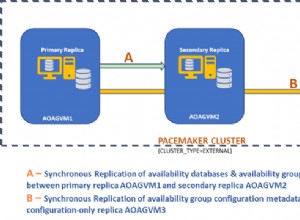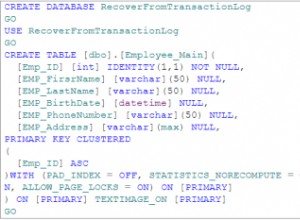O que você está tentando fazer dificilmente é possível em sua totalidade.
Criar SQL dinâmico
Primeiro, veja o que você pode do:uma função plpgsql que cria o SQL para tal consulta:
CREATE OR REPLACE FUNCTION f_union_common_col_sql(text, text)
RETURNS text
AS $function$
DECLARE
_cols text;
BEGIN
_cols := string_agg(attname, ', ')
FROM (
SELECT a.attname
FROM pg_attribute a
WHERE a.attrelid = $1::regclass::oid
AND a.attnum >= 1
INTERSECT
SELECT a.attname
FROM pg_attribute a
WHERE a.attrelid = $2::regclass::oid
AND a.attnum >= 1
) x;
RETURN 'SELECT ' || _cols || '
FROM ' || quote_ident($1) || '
UNION
SELECT ' || _cols || '
FROM ' || quote_ident($1);
END;
$function$ LANGUAGE plpgsql;
COMMENT ON FUNCTION f_union_common_col_sql(text, text) IS 'Create SQL to query all visible columns that two tables have in common.
# Without duplicates. Use UNION ALL if you want to include duplicates.
# Depends on visibility dicatated by search_path
$1 .. table1: optionally schema-qualified, case sensitive!
$2 .. table2: optionally schema-qualified, case sensitive!';
Ligar:
SELECT f_union_common_col_sql('myschema1.tbl1', 'myschema2.tbl2');
Dá-lhe a consulta completa. Execute-o em uma segunda chamada.
Você pode encontrar quase tudo o que usei aqui no manual de funções plpgsql .
A função agregada
string_agg()
foi introduzido com o PostgreSQL 9.0. Em versões mais antigas você faria:array_to_string(array_agg(attname), ', ') . Executar SQL dinâmico?
Em seguida, aqui está o que você dificilmente pode Faz:
CREATE OR REPLACE FUNCTION f_union_common_col(text, text)
RETURNS SETOF record AS
$BODY$
DECLARE
_cols text;
BEGIN
_cols := string_agg(attname, ', ')
FROM (
SELECT a.attname
FROM pg_attribute a
WHERE a.attrelid = $1::regclass::oid
AND a.attnum >= 1
INTERSECT
SELECT a.attname
FROM pg_attribute a
WHERE a.attrelid = $2::regclass::oid
AND a.attnum >= 1
) x;
RETURN QUERY EXECUTE '
SELECT ' || _cols || '
FROM quote_ident($1)
UNION
SELECT ' || _cols || '
FROM quote_ident($2)';
END;
$BODY$
LANGUAGE plpgsql VOLATILE;
COMMENT ON FUNCTION f_union_common_col(text, text) IS 'Query all visible columns that two tables have in common.
# Without duplicates. Use UNION ALL if you want to include duplicates.
# Depends on visibility dicatated by search_path
# !BUT! you need to specify a column definition list for every call. So, hardly useful.
$1 .. table1 (optionally schema-qualified)
$2 .. table1 (optionally schema-qualified)';
Uma chamada de função requer que você especifique a lista de colunas de destino. então isso dificilmente é útil:
SELECT * from f_union_common_col('myschema1.tbl1', 'myschema2.tbl2')
ERROR: a column definition list is required for functions returning "record"
Não há uma maneira fácil de contornar isso. Você teria que criar dinamicamente uma função ou pelo menos um tipo complexo. É aqui que eu paro.




